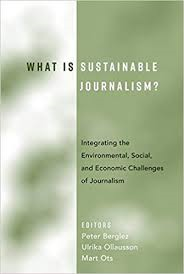Abstract
Deliberative public sphere theories ascribe an ‘epistemic dimension’ to public debates: they do not necessarily foster consensus, but rather an enhanced understanding among the participants of the debate through the exchange of opinions backed by justifications (Habermas 2006; Peters 2005). Public discourses provide a critical validation of issues of shared relevance. They are an important precondition for the sustainable evolution of society as a society without open debates becomes blind to the concerns of its citizens. This is why the sustainability of public debates is a major concern for society and for communication studies. Reality will always fall short of normative models of the public sphere (see e.g. Walter 2015), yet when issues become so polarized that an open debate among speakers from different backgrounds becomes impossible, this constitutes a problem for democracy. In the following study of journalism’s role in the climate debate, I will argue that we are witnessing the evolution of post-normal journalism that is fundamentally interpretive and characterized by the blurring of institutional boundaries between journalism, science and advocacy.

Brüggemann, Michael (2017): Post-normal journalism: Climate journalism and its changing contribution to an unsustainable debate. In Peter Berglez, Ulrika Olausson, Mart Ots (Eds.): What is Sustainable Journalism? Integrating the Environmental, Social, and Economic Challenges of Journalism. New York: Peter Lang, pp. 57–73. Available online at https://doi.org/10.3726/b11462.
